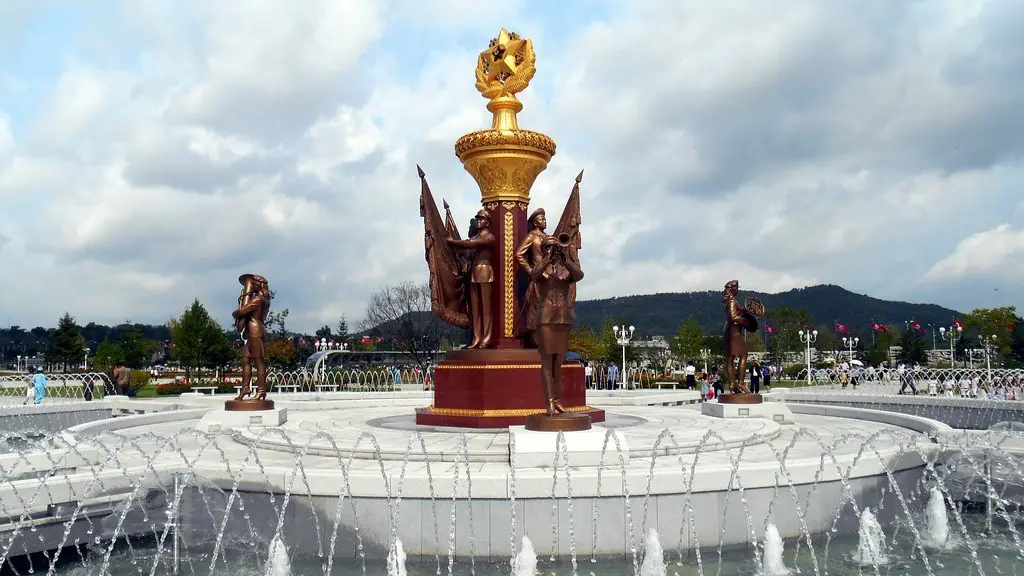Living Conditions
North Korea is often presented in a negative light by the Western media and with good reason. There is severe poverty and a lack of basic amenities. The standard of living in North Korea is extremely low despite the country having one of the highest GDP per capita rankings in Northeast Asia. The average North Korean does not have access to electricity or the Internet and food is scarce. The extreme deprivation of basic human rights and freedom of speech is a major cause for concern. People in North Korea are constantly monitored and have only limited access to outside information. The government has a policy of denying humanitarian aid from other countries as a matter of national pride, placing an unfair burden on its own people.
The People
Despite their difficult living conditions, the people of North Korea are known for their resilience. Their culture is deeply rooted in tradition, with families often living in the same area for generations. North Koreans can take pride in their martial arts, food, and traditional music.
The government also has an effective propaganda system in place, indoctrinating the population with loyalty to their leader and the state. Unfortunately, what this also means is that even if people were aware of the human rights abuses in North Korea, they would be afraid to speak out. There is also intense pressure to conform to the expectations of the current regime.
Economic Situation
The North Korean economy has been struggling for quite some time. The issue of poverty and food insecurity is especially critical in the country. While the government maintains a strong focus on militarization and the development of nuclear weapons, the level of poverty among its citizens remains painfully high. In fact, the UN estimates that over 70% of North Koreans are living below the poverty line.
The economy is heavily reliant on foreign aid, and the lack of market reform has resulted in a sluggish economic growth. Over the years, there have been some attempts at trying to open up the economy to foreign trade, but with limited success.
Political System
North Korea has a highly centralized government, with the Supreme Leader wielding near-absolute authority over the people. The current leader, Kim Jong Un, is the third generation of the same family to wield absolute power in North Korea. The North Korean government is known for its repressive policies, its censorship of information, and its human rights abuses. People are not allowed to openly criticize the government or question its policies.
The government has resisted any attempts by the international community to encourage reform and has even gone as far as to make threats against its neighbor South Korea, with whom it shares a tense and dangerous relationship.
International Impact
In recent years, North Korea has been in the global spotlight for its nuclear weapons development and human rights abuses. The country has repeatedly tested ballistic missiles, and its threats against its neighbor South Korea have been met with condemnation from the international community. This has caused a strain on diplomatic ties and caused an increase in international tensions in the region.
Various international organizations, such as the United Nations, have encouraged the North Korean government to implement positive reforms and end its human rights abuses. However, the government remains relatively intransigent, and analysts worry that the situation could become much worse if the international community does not take action to stop the country’s nuclear program.
Health Care
The health care system in North Korea is in a state of disrepair. Due to extreme poverty and lack of access to medical supplies, the system is extremely weak. The majority of medical facilities in the country lack basic resources and medicine, and even basic medical treatments are not available in most areas. As a result, mortality rates are much higher in North Korea than in neighboring countries.
The lack of access to medical information and resources also limits the effectiveness of North Korea’s health care system. Even though the country has a system of health insurance, most citizens do not have access to it due to poverty or other factors.
Education
Education in North Korea is heavily focused on indoctrinating students with loyalty to the government. School curriculums are designed to promote the traditions and history of North Korea and its current leader, while discouraging creativity and independent thinking. As a result, citizens are not allowed to think freely or make their own decisions.
There are limited opportunities for higher education in North Korea and most students are only able to attend secondary schools. Even at these schools, textbooks are limited and teachers are often ill-equipped to handle large numbers of students. In addition, the country has a chronic shortage of qualified teachers, making it even more difficult for students to get a quality education.
Culture and Arts
Despite their limited access to the outside world, North Koreans have a vibrant culture and arts scene. Traditional music, songs, and dances are still performed at festivals, and North Koreans take great pride in their martial arts. North Korea also has its own national cinema, which often features stories with government-approved political messages.
Painting and sculpture are popular forms of art, as well as literature. North Koreans do read books, however they are restricted to only government-approved literature. North Korean poetry and literature often revolves around themes such as nationalism and strength.
Leisure and Recreation
North Koreans take great pride in their leisure and recreation activities, and there is a wide range of activities available to citizens. Traditional sports, such as archery and martial arts, are popular and chess is also a popular pastime. People in North Korea also take part in various activities, such as rock climbing and mountain biking.
The country also has its own national holiday, the Day of the Sun, which celebrates the legacy of the country’s late leader, Kim Il-sung. On this day, North Koreans hold public performances and rallies to show their loyalty and dedication to the state.
Sports
Sports play a significant role in North Korean culture and many North Koreans take great pride in national victories in major sporting events. North Korea has its own professional football and basketball leagues, in addition to traditional martial arts tournaments. North Koreans are also very proud of their table tennis, wrestling and weightlifting teams, which often bring home medals in international competitions.
In recent years, North Korea has sent teams to international sporting events such as the Olympic Games and the Asian Games. Though North Korean athletes don’t usually compete with top teams, they often put in impressive performances, especially in martial arts and gymnastics. Sports are also used by the state as a form of propaganda, with athletes often featured prominently in state-run media.
Religion
Religion is officially banned in North Korea, with the government promoting atheism as the only accepted faith. The state has a policy of actively suppressing any public expression of religion, particularly Christianity and Buddhism. This policy has led to the arrest and imprisonment of religious figures and the demolition of religious sites.
In recent years, there have been reports of a rise in secret religious activity in North Korea, with Christian communities often gathering in small groups in homes to discuss the bible. Though it’s difficult to measure the true level of religious activity in North Korea, it is clear that there is a strong desire among citizens to express their faith freely.


